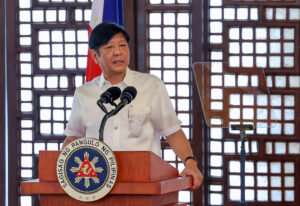
Marcos says Mindanao separation push ‘doomed to fail’
By Kyle Aristophere T. Atienza, Reporter
PHILIPPINE President Ferdinand R. Marcos, Jr. has warned against the push of his predecessor-turned-critic, Rodrigo R. Duterte, for the separation of the southern island of Mindanao from the rest of the nation, saying it is a violation of the 37-year-old Charter.
“The new call for a separate Mindanao is doomed to fail, for it is anchored on a false premise, not to mention a sheer constitutional travesty,” Mr. Marcos said in a speech at a commemoration event for the 1987 Constitution on Thursday.
Mr. Duterte in late January said local political forces would be regrouping in the Davao region to start a signature campaign for the separation of Mindanao from the Philippines — a move that has been opposed by various government agencies, including the departments of Justice and Defense.
Mr. Marcos said current the leadership of the Bangsamoro region, which was created in 2019 after successful talks between the National Government and Moro separatists, has already “repudiated this preposterous proposal.”
“And so did other political leaders of Mindanao,” he added, noting “effective local autonomy has been achieved across the country, especially in the Bangsamoro region, “without compromising our national integrity in the slightest degree.”
“I strongly appeal to all concerned to stop this call for a separate Mindanao,” he said. “This is a grave violation of the Constitution.”
Earlier in the day, Mr. Marcos led the 17th meeting of the National Government–Bangsamoro Government Intergovernmental Relations Body, where he warned against forces that seek to thwart democratic processes ahead of the first parliamentary election in the Bangsamoro Autonomous Region in Muslim Mindanao (BARMM).
“We cannot allow forces outside of the democratic process to deviate our dreams and our aspirations from a democratic process,” he said in a speech, as he called for the protection of the parliamentary elections in the region in 2025.
He said Filipinos should never allow even a single voter to be disenfranchised by violence, intimidation, or bribery.
The Bangsamoro Transition Authority (BTA) in March last year passed an electoral code that paved the way for the creation of political parties in the region with representatives from women, youth, indigenous people, and settler communities.
The first-ever parliament elections in the region was originally set for May 2022 but was postponed due to the coronavirus pandemic.
“A stronger BARMM is a stronger Mindanao; a stronger Mindanao means a stronger Philippines, bringing us closer to achieving our agendas,” Mr. Marcos said.
Citing its December 2023 survey, research firm WR Numero said recently that 57% of Filipinos hold either a positive or a very positive view of the creation of the BARMM.
It replaced the Autonomous Region in Muslim Mindanao (ARMM) after peace talks between the National Government and the Moro Islamic Liberation Front, which had called for a region with more powers.
Bangsamoro Chief Minister Ahod Balawag Ebrahim and BTA Deputy Speaker Omar Yasser Sema, a second-generation member of the Moro National Liberation Front, have already rejected Mr. Duterte’s separatist call.
Moro rebels have long abandoned calls for secession, they said, citing gains from past peace negotiations.
Mr. Duterte unveiled the plan for a separate Mindanao days after openly attacking the Marcos administration in a political rally in Davao City on Jan. 28, where he called his successor a drug addict and slammed the International Criminal Court for its probe on its deadly war on drugs.
The former populist leader also linked Mr. Marcos and his allies in Congress to a so-called people’s initiative for Charter change and warned that could lead to him being ousted like his late father and namesake.
At the Constitution Day event, which was hosted by the Philippine Constitution Association (Philconsa) and the Manila Overseas Press Club, Mr. Marcos also stressed the need to amend the Charter’s “restrictive” economic provisions.
His support for reform “extends to economic matters only” and “nothing more.”
“We are happy that he also took note of our consistent advocacy in the House of Representatives for changing those restrictive provisions for more than three decades since the 8th Congress, or since 36-37 years ago,” Speaker Martin G. Romualdez, a cousin to Mr. Marcos, said in a statement.
“At the risk of being makulit (stubborn), we have been saying that we do not advocate any political amendment,” said Mr. Romualdez, who joined Mr. Marcos and other officials on the stage.
The House Speaker heads the Constitution association.



